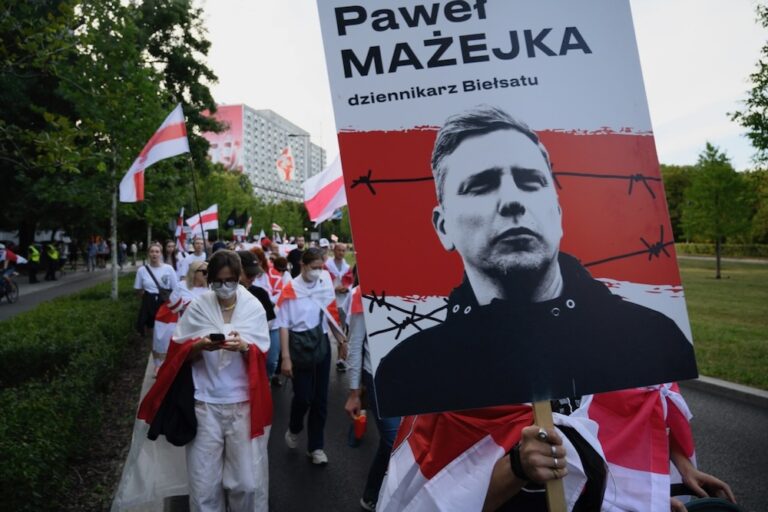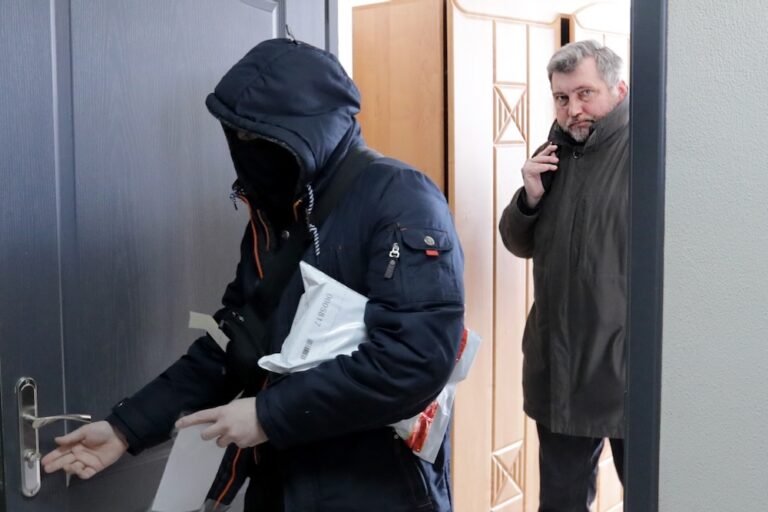(HRW/IFEX) – On 24 February 1998, a Minsk court sentenced two teenagers, sixteen-year-old Vadim Labkovich and nineteen-year-old Alexei Shidlovsky, respectively to a one-and-a-half year suspended prison term and a one-and-a-half year unsuspended prison term in a strict regime colony for writing political graffiti and replacing an official state flag with the banned flag of “independent” […]
(HRW/IFEX) – On 24 February 1998, a Minsk court sentenced two teenagers,
sixteen-year-old Vadim Labkovich and nineteen-year-old Alexei Shidlovsky,
respectively to a one-and-a-half year suspended prison term and a
one-and-a-half year unsuspended prison term in a strict regime colony for
writing political graffiti and replacing an official state flag with the
banned flag of “independent” Belarus.
Shidlovsky and Labkovich are members of the Malady Front, the youth wing of
the Belarusian
People’s Front, the country’s most visible opposition party. In the early
hours of 3 August 1997, a small group of young people in the provincial town
of Stolptsy wrote opposition and anti-presidential graffiti of varying
degrees of profanity on the walls of the town’s government buildings and on
monuments to Lenin and Dzerzhinsky, the founder of the predecessor to the
KGB. Shidlovsky and Labkovich were members of this group. Some of the youths
also took down the official state flag, resurrected in 1995 from the Soviet
era, from the town government building and replaced it with the banned
white-red-white flag of “independent” Belarus, now associated with the
opposition. Waving the white and red flag at a demonstration is now an
offense punishable by a fine or administrative detention. Police arrested
Shidlovsky and Labkovich on 25 and 27 August 1997 respectively (not
previously reported by IFEX.)
HRW monitors were present at the trial as the state prosecutor accused the
teenagers of hooliganism with “especial insolence and extreme cynicism” and
demanded two years of imprisonment in a strict-regime labor camp for
Shidlovsky and a two-year suspended sentence for Labkovich. On the first day
of proceedings, as if addressing a violent recidivist representing a grave
threat to society, presiding judge Lavrov stated to Shidlovsky, “Thank God
that you have been behind bars since August.”
HRW condemns the proceedings as a show trial and a mockery of justice.
During the four-day court hearing, Labkovich and Shidlovsky, who had already
spent nearly six months in pre-trial detention, sat in an iron cage
surrounded by eight armed police men with an attack dog with dozens of riot
police throughout the court building.
“This trial is an absurd parody of criminal justice and a grotesque show
trial aimed at intimidating young people from expressing their opposition to
the current regime in Belarus,” declared Holly Cartner, Executive Director
of Human Rights Watch’s Europe and Central Asia Division. “In most states
with even the trappings of rule of law, the alleged offenses, which were
committed by teenagers – first-time offenders – would warrant, at most, a
warning or a fine,” continued Ms Cartner.
In this clearly political case, the Belarusian government not only deprived
a schoolboy and a
college student, whose guilt had yet to be proven, of their liberty for six
months but in so doing
exposed the pair to severely overcrowded, unsanitary, abusive and at times
violent conditions in
various detention facilities outside Minsk. The government also asked the
Committee on State
Security (KGB) to investigate the case. After nearly six months of criminal
investigation, the state managed to produce just three witnesses, of whom
only one claimed to have seen Shidlovsky writing on the wall of a library
building. The remaining evidence was based solely on the two teenagers’
partial confessions.
Since coming to power in July 1994, President Lukashenka has undone nearly
all the positive
changes in the area of human rights and freedoms and democratization that
characterized the
perestroika and post-Soviet periods. “Belarus exhibits an increasing and
eerie resemblance to the
worst aspects of the Soviet Union, with all the hallmarks of Soviet-style
repression,” commented
Ms. Cartner. “This trial is one of the more perverse manifestations of this
tendency.”
In addition to repressive campaigns against the independent media,
non-governmental
organizations, opposition politicians and parties, the government is
increasingly targeting young
people associated with the opposition. Several politically active students,
including Shidlovksy,
have been expelled from university ostensibly for non-attendance or failing
exams, but more
likely for their political activity. Over the last year, government
harassment has forced several
members of the Malady Front to seek asylum abroad. Credible reports indicate
that high-school
teachers have dissuaded pupils from participating in demonstrations and
opposition activities.
During the trial of Labkovich and Shidlovsky, the prosecutor and judge
repeatedly drew negative
inferences from the expression of anti-presidential sentiment and membership
of the Malady
Front. Furthermore, on 23 February 1998, police detained three teenage
members of the Malady Front and a trial observer for the Belarusian Helsinki
Committee, who had been denied entry into the hearing for holding an
“unsanctioned demonstration” outside the court building, and kept them for
several hours at a police station. Earlier, Yury Moroz, who on the first
day of the trial
brought a placard demanding freedom for Shidlovsky and Labkovich, was
sentenced to fifteen-days of administrative detention.


